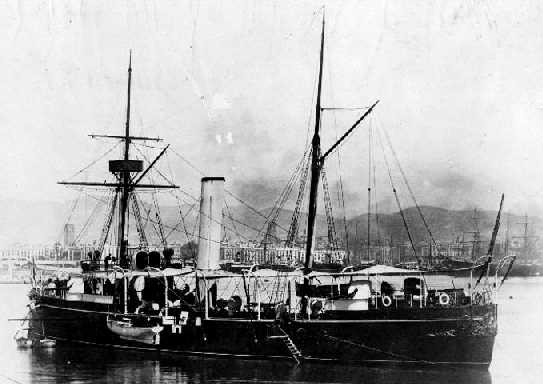


The ISLA DE LUZON was completed in 1887 and joined the fleet of metropolis, based at Cadiz, Spain. During 1893 and 1894, the vessel took part in the Moroccan War, and bombarded the reefs between Melilla and Chafarinos.
With the beginning of the Philippine Insurrection against Spain, The ISLA DE LUZON, along with her sister ship, the ISLA DE CUBA, was sent to the Philippines to join the squadron of Admiral Montojo At the beginning of the Spanish American War, she and her sister were the most powerful and modern vessel in the squadron.
During the Battle of Manila Bay/Cavite the ISLA DE LUZON served on the right flank of the Spanish squadron. At first the ships of the American Asiatic Squadron concentrated their fire on the larger REINA CRISTINA and CASTILLA. As a result, the ISLA DE LUZON suffered little damage. She was struck by American shells three times, including one hit which damaged one of her guns. Six of her crewmen were wounded. Immediately after the battle, a party from the PETREL was sent aboard the ISLA DE LUZON to set her afire.
After the cruiser was salvaged, she was towed to Singapore for repair. On January 31, 1900, the repair work on her was completed and she was commissioned as a vessel in the U.S. Navy under the command of commander J. V. B. Bleecker. She served in the Southern Squadron in the Philippines during the Philippine Insurrection against the United States.
On August 15, 1902 she steamed for the United States. En route, the vessel stopped at Muscat, where the crew, in keeping with tradition, painted "Isla de Luzon" on the cliffs at the harbor entrance. After passing through the Suez canal, she arrived in Pensacola, Florida on March 16, 1903. On December 6, 1903, she was assigned duty with the Louisiana Naval Militia, and later with the Illinois Naval Militia. In 1911, the vessel was re-boilered with new Babcock and Wilcox boilers.
With the outbreak of World War One, the ISLA DE LUZON served as a training vessel at Chicago. On September 30, 1918, she was reassigned to serve at the Naval Torpedo School in Newport, Rhode Island. Equipped with new torpedo tubes, she served on the torpedo range from November 13 to December 13, 1918.
The ISLA DE LUZON was finally decommissioned on February 15, 1919, though she continued to serve in the Naval Torpedo Station until July 23, when she was struck from the navy rolls.
The vessel was sold on March 10, 1920 to the Bahama & West Indies Trading Co. of New York, and was renamed REVIVER
The vessel was a small protected cruiser, or, more properly a gunboat.
Her ratio of length to beam was small, and as a result, she had poor
seagoing capabilities. She had a tendency to bury her bow into
the waves.
| Classification: | Protected Cruiser, 2nd Class |
|---|---|
| Laid down: | February 25, 1886 |
| Launched: | November 13, 1886 |
| Completed: | September 22, 1887 |
| Rig: | Two masts, schooner rig |
| Armament: | Four 120mm/35 cal. (4") Hontoria Breechloading guns |
| Four 57mm/43 cal. (6 pounder) Nordenfeldt guns | |
|
Three 37 mm/20 cal. revolving guns
|
|
| Three 356 mm (14") torpedo tubes | |
| Contractor: | Armstrong (Elswick, UK) |
| Length: | 56.11 meters |
| Beam: | 8.87 meters |
| Draft: | 3.84 meters |
| Displacement: | 1030 tons |
| Complement: | 164 Officers and Enlisted Men under the command of Capt. J. L. Human |
| Engine type: | Horizontal triple-expansion engines, 2600 hp. Two shafts. |
| Boiler type: | Two boilers |
| Speed: | 15.9 knots (during speed trials) |
| Bunker Capacity: |
160 tons
|
| Coal Endurance: |
2,000 miles
|
| Armor: | 25mm to 64 mm, deck; 51 mm casemate |
| Cost: |
2.4 million pesetas
|
Dictionary of American Naval Fighting Ships, Vol. III (Washington DC: U.S. Government Printing Office, 1977) 466.
Wilson, H. W., Downfall of Spain (London: 1900).